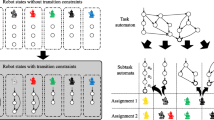Abstract
This paper addresses the problem of path planning for multiple robots under high-level specifications given as syntactically co-safe linear temporal logic formulae. Most of the existing solutions use the notion of abstraction to obtain a discrete transition system that simulates the dynamics of the robot. Nevertheless, these solutions have poor scalability with the dimension of the configuration space of the robots. For problems with a single robot, sampling-based methods have been presented as a solution to alleviate this limitation. The proposed solution extends the idea of sampling methods to the multiple robot case. The method samples the configuration space of the robots to incrementally constructs a transition system that models the motion of all the robots as a group. This transition system is then combined with a Büchi automaton, representing the specification, in a Cartesian product. The product is updated with each expansion of the transition system until a solution is found. We also present a new algorithm that improves the performance of the proposed method by guiding the expansion of the transition system. The method is demonstrated with examples considering different number of robots and specifications.
F.J. Montana is supported by the Mexican National Council of Science and Technology (CONACyT). Jun Liu is supported in part by the Natural Sciences and Engineering Research Council (NSERC) of Canada and the Canada Research Chairs (CRC) program.
Access this chapter
Tax calculation will be finalised at checkout
Purchases are for personal use only
Similar content being viewed by others
References
Alur, R., Henzinger, T.A., Lafferriere, G., Pappas, G.J.: Discrete abstractions of hybrid systems. Proc. IEEE 88(7), 971–984 (2000)
Chen, Y., Ding, X.C., Belta, C.: Synthesis of distributed control and communication schemes from global LTL specifications. In: Proceedings of CDC-ECC, pp. 2718–2723. IEEE (2011)
van Den Berg, J., Snoeyink, J., Lin, M.C., Manocha, D.: Centralized path planning for multiple robots: optimal decoupling into sequential plans. In: Robotics: Science and Systems, vol. 2, pp. 2–3 (2009)
Dobson, A., Bekris, K.E.: Sparse roadmap spanners for asymptotically near-optimal motion planning. Int. J. Robot. Res. 33(1), 18–47 (2014)
Fainekos, G.E., Girard, A., Kress-Gazit, H., Pappas, G.J.: Temporal logic motion planning for dynamic robots. Automatica 45(2), 343–352 (2009)
Guo, M., Dimarogonas, D.V.: Multi-agent plan reconfiguration under local LTL specifications. Int. J. Robot. Res. 34(2), 218–235 (2015)
Kantaros, Y., Zavlanos, M.M.: Sampling-based control synthesis for multi-robot systems under global temporal specifications. In: Proceedings of ICCPS, pp. 3–13. ACM (2017)
Karaman, S., Frazzoli, E.: Sampling-based motion planning with deterministic \(\mu \)-calculus specifications. In: Proceedings of CDC/CCC, pp. 2222–2229. IEEE (2009)
Kavraki, L.E., Svestka, P., Latombe, J.C., Overmars, M.H.: Probabilistic roadmaps for path planning in high-dimensional configuration spaces. IEEE Trans. Robot. Autom. 12(4), 566–580 (1996)
Kloetzer, M., Belta, C.: Automatic deployment of distributed teams of robots from temporal logic motion specifications. IEEE Trans. Rob. 26(1), 48–61 (2010)
Kupferman, O., Vardi, M.Y.: Model checking of safety properties. Formal Meth. Syst. Des. 19(3), 291–314 (2001)
Leahy, K., Jones, A., Schwager, M., Belta, C.: Distributed information gathering policies under temporal logic constraints. In: Proceedings of CDC, pp. 6803–6808. IEEE (2015)
Magnenat, S., Waibel, M., Beyeler, A.: Enki: the fast 2D robot simulator (2011). http://home.gna.org/enki
Mondada, F., Bonani, M., Raemy, X., Pugh, J., Cianci, C., Klaptocz, A., Magnenat, S., Zufferey, J.C., Floreano, D., Martinoli, A.: The e-puck, a robot designed for education in engineering. In: Proceedings of ICARSC, pp. 59–65. IPCB (2009)
Montana, F.J., Liu, J., Dodd, T.J.: Sampling-based stochastic optimal control with metric interval temporal logic specifications. In: Proceedings of CCA, pp. 767–773. IEEE (2016)
Solovey, K., Salzman, O., Halperin, D.: Finding a needle in an exponential haystack: Discrete RRT for exploration of implicit roadmaps in multi-robot motion planning. Int. J. Robot. Res. 35(5), 501–513 (2016)
Švestka, P., Overmars, M.H.: Coordinated path planning for multiple robots. Rob. Auton. Syst. 23(3), 125–152 (1998)
Svoreňová, M., Křetínský, J., Chmelík, M., Chatterjee, K., Černá, I., Belta, C.: Temporal logic control for stochastic linear systems using abstraction refinement of probabilistic games. In: Proceedings of HSCC, pp. 259–268. ACM (2015)
Tumová, J., Dimarogonas, D.V.: A receding horizon approach to multi-agent planning from local LTL specifications. In: Proceedings of ACC, pp. 1775–1780. IEEE (2014)
Ulusoy, A., Smith, S.L., Ding, X.C., Belta, C., Rus, D.: Optimality and robustness in multi-robot path planning with temporal logic constraints. Int. J. Robot. Res. 32(8), 889–911 (2013)
Vasile, C.I., Belta, C.: Sampling-based temporal logic path planning. In: Proceedings of IROS, pp. 4817–4822. IEEE (2013)
Wolff, E.M., Topcu, U., Murray, R.M.: Optimal control of non-deterministic systems for a computationally efficient fragment of temporal logic. In: Proceedings of CDC, pp. 3197–3204. IEEE (2013)
Zhang, Z., Cowlagi, R.V.: Motion-planning with global temporal logic specifications for multiple nonholonomic robotic vehicles. In: Proceedings of ACC, pp. 7098–7103. IEEE (2016)
Author information
Authors and Affiliations
Corresponding author
Editor information
Editors and Affiliations
Rights and permissions
Copyright information
© 2017 Springer International Publishing AG
About this paper
Cite this paper
Montana, F.J., Liu, J., Dodd, T.J. (2017). Sampling-Based Path Planning for Multi-robot Systems with Co-Safe Linear Temporal Logic Specifications. In: Petrucci, L., Seceleanu, C., Cavalcanti, A. (eds) Critical Systems: Formal Methods and Automated Verification. AVoCS FMICS 2017 2017. Lecture Notes in Computer Science(), vol 10471. Springer, Cham. https://doi.org/10.1007/978-3-319-67113-0_10
Download citation
DOI: https://doi.org/10.1007/978-3-319-67113-0_10
Published:
Publisher Name: Springer, Cham
Print ISBN: 978-3-319-67112-3
Online ISBN: 978-3-319-67113-0
eBook Packages: Computer ScienceComputer Science (R0)




